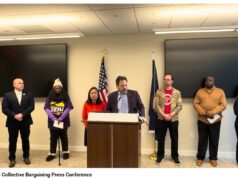Over a hundred years ago, Upton Sinclair exposed the shocking working conditions in the meat packing industry, in The Jungle.
This week the Trump Administration ordered meat packing plants to remain open, and workers to continue to work at plants known to be rife with COVID-19 infections.
What happened in between? The rise, and subsequent fall, of the power of organized labor.
In 1906, Upton Sinclair wrote a scathing expose of industrial America, focusing on the meat packing industry. Workers worked 10 hours a day in the worst and most unsanitary conditions, in a rat-infested plant where leftover scraps of meat rotted in waste barrels. Exhausted and overworked workers often lost fingers or hands into the heavy machinery, or fell into the processing vats altogether, and were revoltingly shipped out with the meat. Desperate for jobs, low-income workers, especially immigrants worked these jobs. “Here was a population, low-class and mostly foreign, hanging always on the verge of starvation, and dependent for its opportunities of life upon the whim of men every bit as brutal and unscrupulous as the old-time slave drivers.”
Following the release of the book, the public demanded reform in the meat-packing industry. And reforms came to the hygiene, inspections, and quality of the meat products themselves. But there was no help for the workers in that. It wasn’t until workers began to organize and unite in unions, and eventually form the first national organization to improve their working standards, the Amalgamated Meat Cutters and Butcher Workmen of North America, and in 1943, the United Packinghouse Workers of America (UPWA) union (now part of United Food and Commercial Workers), that workers finally were able to bargain for better wages and safer working conditions. This union improved the lives of meatpackers, enabling them to enjoy the benefits of being in the middle-class.
But market agglomeration, and increased mechanization led many small regional plants to close and enabled larger companies to weaken union power by closing their union plants and moving to “Right to Work” states (like Virginia, where Smithfield Foods is located). Today, these giant corporations keep their labor costs low by paying low wages and maintaining unsafe line speed. Workers are discouraged from joining unions. In 2005, Human Rights Watch released a report on the meatpacking industry finding that the work conditions in many plants violated basic human rights.
So it shouldn’t be surprising that when the coronavirus hit, it hit workers in the meatpacking industry hard. These people work in close quarters, with low wages and benefits that prevent them from taking time off when they’re sick. One worker at a plant in California reported that “lots of people…were coughing, sneezing, or sweating.” And now he is sick and so is his wife. At least 22 plants have closed at some point due to employees testing positive for COVID-19. 6,500 workers have been infected, with 20 workers dying.
And now, President Trump has used the Defense Production Act not to order mass production of masks and other PPE, but to order the meatpacking industry to remain open, after reports (including a full page ad taken out by Tysons Foods itself) that the supply chain might be breaking and that meat shortages might result. Workers have been promised resources for testing and other safety precautions, but these have not materialized, and the workers are being forced back to work in plants where the virus has already infected and killed their co-workers. During both world wars, Americans managed to sacrifice eating meat for the good of the war effort—but today, with even the slightest threat of a meat shortage, the President is willing to send workers back into harm’s way.
One thing is clear, and if we can find a silver lining to this catastrophe, it’s this: when we rebuild the economy after this pandemic, we need to rebuild it better than it was before—better for workers, and better for society. A strong, organized labor is going to be key to that.


![[UPDATED: VA Senate Dems Pass $15/Hour Minimum Wage Bill] VA House Democrats Pass Top Priority, Paid Sick Leave](https://bluevirginia.us/wp-content/uploads/2026/02/housedemspaidsick-238x178.jpg)








![Friday News: “As Trump Weighs Iran Strikes, He Declines to Make Clear Case for Why, or Why Now”; “A former prince is arrested in the UK with accountability in question in the US”; “MAGA’s Newest Enemy [Abigail Spanberger] to Give State of the Union Rebuttal”](https://bluevirginia.us/wp-content/uploads/2026/02/montage0220-100x75.jpg)
